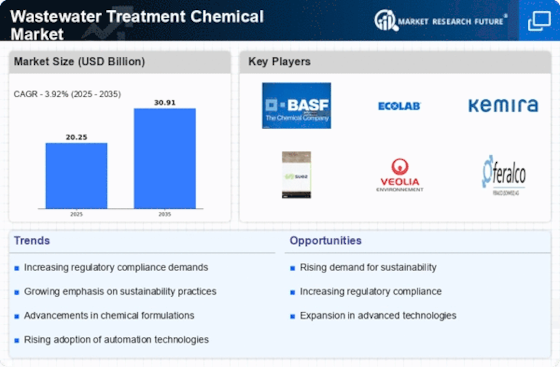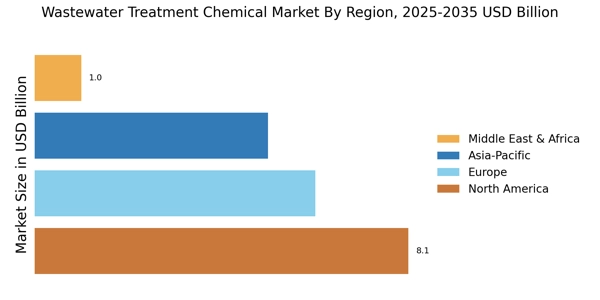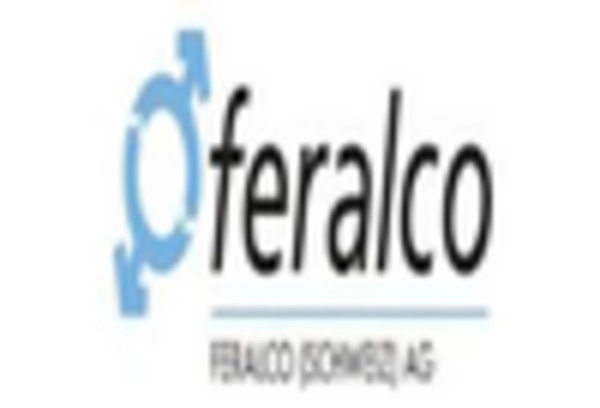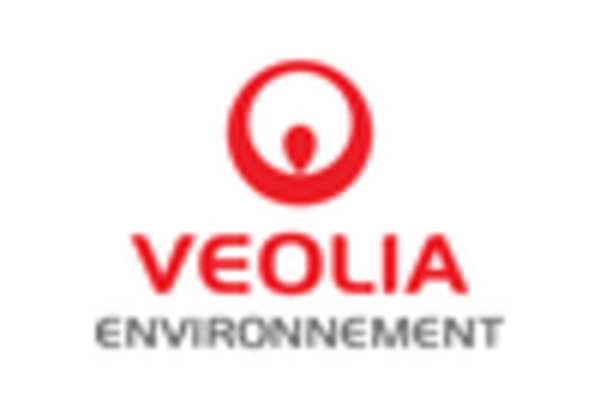Rising Water Scarcity
The increasing scarcity of freshwater resources is a critical driver for the Wastewater Treatment Chemical Market. As populations grow and industrial activities expand, the demand for effective wastewater treatment solutions intensifies. According to recent data, approximately 2 billion people currently live in water-stressed areas, which is likely to escalate the need for advanced wastewater treatment technologies. This situation compels municipalities and industries to invest in wastewater treatment chemicals to ensure the safe reuse of treated water. The market for these chemicals is projected to grow as stakeholders seek to mitigate water scarcity challenges, thereby enhancing the overall sustainability of water resources.
Growing Awareness of Water Reuse
The growing awareness of water reuse and recycling is significantly impacting the Wastewater Treatment Chemical Market. As communities and industries recognize the value of treated wastewater, the demand for effective treatment chemicals is expected to rise. Initiatives promoting water reuse are being adopted in various sectors, including agriculture and municipal water supply. Recent studies suggest that treated wastewater can meet up to 30% of agricultural water needs in some regions. This trend is likely to drive investments in wastewater treatment chemicals, as stakeholders seek to ensure the safety and quality of reused water, thereby fostering sustainable water management practices.
Industrial Growth and Urbanization
Rapid industrial growth and urbanization are pivotal factors influencing the Wastewater Treatment Chemical Market. As urban areas expand, the volume of wastewater generated increases significantly, necessitating efficient treatment solutions. Industries such as textiles, pharmaceuticals, and food processing contribute substantially to wastewater production, which in turn drives the demand for specialized treatment chemicals. Recent statistics indicate that the industrial sector accounts for nearly 70% of total wastewater generation in many regions. Consequently, the need for effective wastewater treatment chemicals is expected to rise, as industries strive to comply with environmental regulations and improve their sustainability practices.
Stringent Environmental Regulations
The implementation of stringent environmental regulations is a major catalyst for the Wastewater Treatment Chemical Market. Governments worldwide are increasingly enforcing laws aimed at reducing pollution and protecting water bodies. For instance, regulations such as the Clean Water Act in the United States mandate that industries treat their wastewater before discharge. This regulatory landscape compels companies to invest in advanced wastewater treatment chemicals to meet compliance standards. The market is likely to expand as businesses seek to avoid penalties and enhance their environmental performance, thereby driving innovation in wastewater treatment solutions.
Technological Innovations in Treatment Processes
Technological innovations in wastewater treatment processes are transforming the Wastewater Treatment Chemical Market. Advances in chemical formulations and treatment technologies enable more efficient and effective removal of contaminants from wastewater. Innovations such as membrane bioreactors and advanced oxidation processes are gaining traction, leading to increased demand for specialized chemicals. The market is projected to benefit from these advancements, as they not only improve treatment efficiency but also reduce operational costs for wastewater treatment facilities. As technology continues to evolve, the industry is likely to witness a surge in the adoption of new treatment chemicals that enhance overall performance.


















